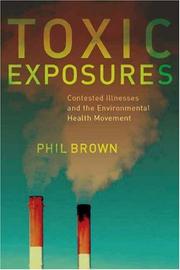| Listing 1 - 2 of 2 |
Sort by
|
Book
ISBN: 2804018164 9782804018160 Year: 2003 Volume: *51 Publisher: Bruxelles Labor
Abstract | Keywords | Export | Availability | Bookmark
 Loading...
Loading...Choose an application
- Reference Manager
- EndNote
- RefWorks (Direct export to RefWorks)
Armes chimiques --- Armes nucléaires --- Chemische wapens --- Kernwapens --- Persian Gulf syndrome --- Persian Gulf War, 1991 --- Syndrome de la guerre du Golfe --- Guerre du golfe Persique, 1991 --- Health aspects --- Aspect sanitaire --- War --- Yugoslav War, 1991-1995 --- Medical aspects --- Veterans --- Diseases --- 355.018 --- Gevolgen van de oorlog. Oorlogsschade --- 355.018 Gevolgen van de oorlog. Oorlogsschade --- War - Medical aspects --- Persian Gulf War, 1991 - Veterans - Diseases --- Yugoslav War, 1991-1995 - Veterans - Diseases

ISBN: 9780231129480 0231129483 9780231503259 0231503253 9786612796241 1282796240 Year: 2007 Publisher: New York, NY
Abstract | Keywords | Export | Availability | Bookmark
 Loading...
Loading...Choose an application
- Reference Manager
- EndNote
- RefWorks (Direct export to RefWorks)
The increase in environmentally induced diseases and the loosening of regulation and safety measures have inspired a massive challenge to established ways of looking at health and the environment. Communities with disease clusters, women facing a growing breast cancer incidence rate, and people of color concerned about the asthma epidemic have become critical of biomedical models that emphasize the role of genetic makeup and individual lifestyle practices. Likewise, scientists have lost patience with their colleagues' and government's failure to adequately address environmental health issues and to safeguard research from corporate manipulation.Focusing specifically on breast cancer, asthma, and Gulf War-related health conditions-"contested illnesses" that have generated intense debate in the medical and political communities-Phil Brown shows how these concerns have launched an environmental health movement that has revolutionized scientific thinking and policy. Before the last three decades of widespread activism regarding toxic exposures, people had little opportunity to get information. Few sympathetic professionals were available, the scientific knowledge base was weak, government agencies were largely unprepared, laypeople were not considered bearers of useful knowledge, and ordinary people lacked their own resources for discovery and action.Brown argues that organized social movements are crucial in recognizing and acting to combat environmental diseases. His book draws on environmental and medical sociology, environmental justice, environmental health science, and social movement studies to show how citizen-science alliances have fought to overturn dominant epidemiological paradigms. His probing look at the ways scientific findings are made available to the public and the changing nature of policy offers a new perspective on health and the environment and the relationship among people, knowledge, power, and authority.
Environmentally induced diseases. --- Asthma --- Breast --- Persian Gulf syndrome --- Maladies de l'environnement --- Asthme --- Sein --- Syndrome de la guerre du Golfe --- Cancer --- Environmental Exposure --- Breast Neoplasms --- Environmental Health --- Persian Gulf Syndrome --- Public Policy. --- Etiology. --- adverse effects. --- etiology. --- trends. --- Public policy. --- Gulf War syndrome --- Persian Gulf War syndrome --- Persian Gulf War, 1991 --- Syndromes --- Clinical ecology --- Diseases --- Environmental illness --- Environmental health --- Medical geography --- Health aspects --- Environmental aspects --- Causes and theories of causation
| Listing 1 - 2 of 2 |
Sort by
|

 Search
Search Feedback
Feedback About UniCat
About UniCat  Help
Help News
News